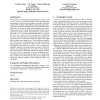Free Online Productivity Tools
i2Speak
i2Symbol
i2OCR
iTex2Img
iWeb2Print
iWeb2Shot
i2Type
iPdf2Split
iPdf2Merge
i2Bopomofo
i2Arabic
i2Style
i2Image
i2PDF
iLatex2Rtf
Sci2ools
CCS
2007
ACM
2007
ACM
Dynamic pharming attacks and locked same-origin policies for web browsers
We describe a new attack against web authentication, which we call dynamic pharming. Dynamic pharming works by hijacking DNS and sending the victim’s browser malicious Javascript, which then exploits DNS rebinding vulnerabilities and the name-based sameorigin policy to hijack a legitimate session after authentication has taken place. As a result, the attack works regardless of the authentication scheme used. Dynamic pharming enables the adversary to eavesdrop on sensitive content, forge transactions, sniff secondary passwords, etc. To counter dynamic pharming attacks, we propose two locked same-origin policies for web browsers. In contrast to the legacy same-origin policy, which regulates cross-object access control in browsers using domain names, the locked same-origin policies enforce access using servers’ X.509 certificates and public keys. We show how our policies help two existing web authentication mechanisms, client-side SSL and SSL-only cookies, resist both pharming and s...
| Added | 07 Jun 2010 |
| Updated | 07 Jun 2010 |
| Type | Conference |
| Year | 2007 |
| Where | CCS |
| Authors | Chris Karlof, Umesh Shankar, J. Doug Tygar, David Wagner |
Comments (0)

